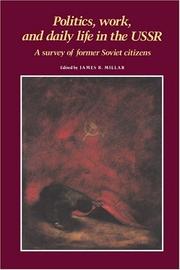| Listing 1 - 10 of 21 | << page >> |
Sort by
|
Book
ISBN: 0269671765 9780269671760 Year: 1970 Publisher: New York: Praeger,
Abstract | Keywords | Export | Availability | Bookmark
 Loading...
Loading...Choose an application
- Reference Manager
- EndNote
- RefWorks (Direct export to RefWorks)
Book
ISBN: 2226010793 9782226010797 Year: 1981 Publisher: Paris: Albin Michel,
Abstract | Keywords | Export | Availability | Bookmark
 Loading...
Loading...Choose an application
- Reference Manager
- EndNote
- RefWorks (Direct export to RefWorks)
Book
ISBN: 2253016470 9782253016472 Year: 1977 Volume: 8300 Publisher: Paris: Librairie générale française,
Abstract | Keywords | Export | Availability | Bookmark
 Loading...
Loading...Choose an application
- Reference Manager
- EndNote
- RefWorks (Direct export to RefWorks)
Book
ISBN: 0865318638 9780865318632 Year: 1985 Publisher: Boulder: Westview press,
Abstract | Keywords | Export | Availability | Bookmark
 Loading...
Loading...Choose an application
- Reference Manager
- EndNote
- RefWorks (Direct export to RefWorks)
Sociology of policy --- Russian Federation --- Soviet Union --- Politics and government --- Economic conditions --- Social conditions --- Russia --- Soviet Union - Politics and government - 1953-1985 --- Soviet Union - Economic conditions - 1975-1985 --- Soviet Union - Social conditions - 1970-1991
Book
ISBN: 2804800776 9782804800772 Year: 2006 Volume: *43 Publisher: Bruxelles: Complexe,
Abstract | Keywords | Export | Availability | Bookmark
 Loading...
Loading...Choose an application
- Reference Manager
- EndNote
- RefWorks (Direct export to RefWorks)
Political rehabilitation --- Réhabilitation (Politique) --- Stalin, Joseph, --- Khrushchev, Nikita Sergeevich, --- Soviet Union --- URSS --- History --- Histoire --- Kommunisticheskai͡a partii͡a Sovetskogo Soi͡uza --- Politics and government --- Réhabilitation (Politique) --- Khrushchev, Nikita Sergeevich, - 1894-1971 --- Soviet Union - Politics and government - 1953-1985

ISBN: 0333331400 9780333331408 Year: 1986 Publisher: [Basingstoke]: MacMillan,
Abstract | Keywords | Export | Availability | Bookmark
 Loading...
Loading...Choose an application
- Reference Manager
- EndNote
- RefWorks (Direct export to RefWorks)
Book
ISBN: 9780807859582 0807859583 Year: 2009 Publisher: Chapel Hill (N.C.): University of North Carolina press,
Abstract | Keywords | Export | Availability | Bookmark
 Loading...
Loading...Choose an application
- Reference Manager
- EndNote
- RefWorks (Direct export to RefWorks)
Book
ISBN: 3772806716 3772806724 9783772806711 Year: 1977 Volume: 65 Publisher: Stuttgart: Frommann-Holzboog,
Abstract | Keywords | Export | Availability | Bookmark
 Loading...
Loading...Choose an application
- Reference Manager
- EndNote
- RefWorks (Direct export to RefWorks)
Political science --- Bureaucracy --- Soviet Union --- Politics and government --- 321.7.011 <47> --- Administration --- Civil government --- Commonwealth, The --- Government --- Political theory --- Political thought --- Politics --- Science, Political --- Social sciences --- State, The --- Interorganizational relations --- Public administration --- Organizational sociology --- Bureaucratie--(staatsvorm)--Rusland. Sovjet-Unie --- -Politics and government --- -Bureaucracy. --- Political science. --- -321.7.011 <47> --- 321.7.011 <47> Bureaucratie--(staatsvorm)--Rusland. Sovjet-Unie --- Bureaucracy. --- -Political science --- Soviet Union - Politics and government - 1953-1985
Book
ISBN: 0691094594 1306986214 0691602301 1400861136 9781400861132 0691631832 Year: 2014 Publisher: Princeton Princeton University Press
Abstract | Keywords | Export | Availability | Bookmark
 Loading...
Loading...Choose an application
- Reference Manager
- EndNote
- RefWorks (Direct export to RefWorks)
In this unprecedented work on the status and role of intellectuals in Soviet political life, a former Soviet sociologist maps out the delicate, often paradoxical, ties between the political regime and the creative thinkers who play a major part in the movement toward modernization. Beginning with Stalin, Vladimir Shlapentokh explores the mutual need and antagonism that have existed between political leaders and intellectuals. What emerges is a fascinating portrayal of the Soviet intellectual network since the 1950s, which touches on such topics as the role of literature and film in political opposition, levels of opposition (open, legal, and private), and the spread of paranoia as fueled by the KGB. Throughout he shows how the intellectual communityusually a cohesive, liberal grouphas fared under Khrushchev's cautious tolerance, Brezhnev's repressions, and now Gorbachev's Glasnost.Shlapentokh maintains, however, that under Glasnost freer speech has revealed a more pronounced divergence between liberal and conservative thinkers, and has allowed for open conservative opposition to the reformatory measures of Gorbachev and the liberals. He argues that one of the strongest checks on reform is the growing presence of Russophilism--a movement supporting Russian nationalism and Stalin's concept of socialism--among the political elite and the masses. Although the role of the liberal intellectuals in the late 1980s was less prominent than it was in the 1960s, Shlapentokh asserts that they remain the major agent of modernization in the Soviet Union, as well as in other socialist countries.Originally published in 1990.The Princeton Legacy Library uses the latest print-on-demand technology to again make available previously out-of-print books from the distinguished backlist of Princeton University Press. These editions preserve the original texts of these important books while presenting them in durable paperback and hardcover editions. The goal of the Princeton Legacy Library is to vastly increase access to the rich scholarly heritage found in the thousands of books published by Princeton University Press since its founding in 1905.
Soviet Union -- Intellectual life. --- Soviet Union -- Politics and government -- 1953-1985. --- Soviet Union -- Politics and government -- 1985-1991. --- Soviet Union --- Intellectual life. --- Politics and government --- Intellectual life --- From 1917 --- 1953-1985 --- 1986 --- -Soviet Union - Intellectual life - 1917 --- -Soviet nion - Politics and government - 1953-1985. --- Soviet Union - Politics and government - 1986 --- -Soviet Union --- HISTORY / Russia & the Former Soviet Union. --- -HISTORY / Russia & the Former Soviet Union. --- Soviet Union - Intellectual life - 1917

ISBN: 0521334764 0521348900 0511664184 0511872496 9780521334761 9780521348904 9780511664182 Year: 1987 Publisher: Cambridge Cambridge University Press
Abstract | Keywords | Export | Availability | Bookmark
 Loading...
Loading...Choose an application
- Reference Manager
- EndNote
- RefWorks (Direct export to RefWorks)
Politics, work, and daily life in the USSR is designed to illustrate how the Soviet social system really works and how the Soviet people cope with it. This study is based on the first comprehensive survey of life in the USSR since the Harvard Project over thiry-three years ago. The essays contained analyze the variations in attitude and behaviour reflected in the findings of the Soviet Interview Project, a five-year investigation of contemporary daily life in the USSR. The survey involved interviewing thousands of recent emigrants from the USSR to the United States as a means of learning about their former day-to-day lives. Some aspects of this survey dealt with areas the Soviets themselves had never investigated, so the data were not, and indeed still are not, available even in unpublished Soviet sources. This study of a large volume of firsthand observations is extremely valuable to anyone interested in the inner workings and behavioural dynamics of the contemporary Soviet social system.
Political sociology --- Sociology of work --- Sociology of culture --- Russia --- Quality of life --- Soviet Union --- Social conditions --- Politics and government --- Economic conditions --- 316.3 <47+57> --- 316.3 <47+57> Sociale structuur --(sociologie)--?<47+57> --- Sociale structuur --(sociologie)--?<47+57> --- Social Sciences --- Political Science --- Quality of life - Soviet Union --- Soviet Union - Social conditions - 1970-1991 --- Soviet Union - Politics and government - 1953-1985 --- Soviet Union - Economic conditions - 1975-1985
| Listing 1 - 10 of 21 | << page >> |
Sort by
|

 Search
Search Feedback
Feedback About UniCat
About UniCat  Help
Help News
News